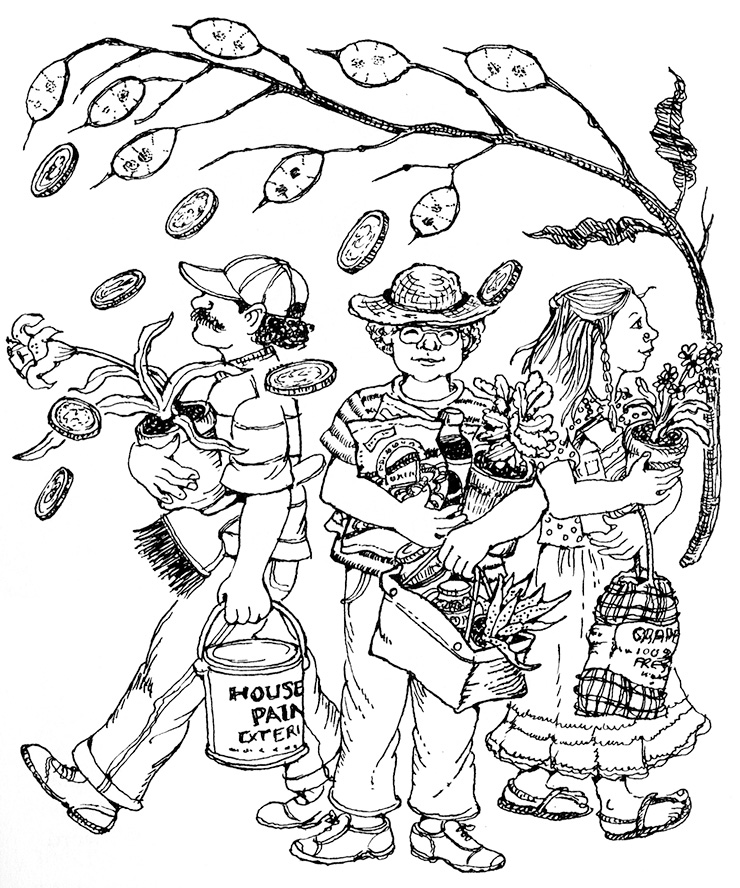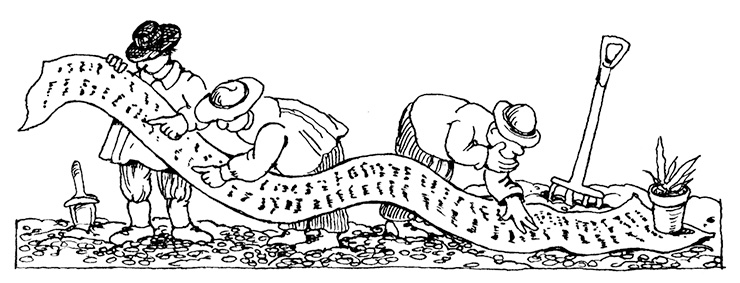
Years ago my mother was in the hospital, and my sister and I gathered beech leaves to soak in glycerin, so they would keep through Winter. As long as either of us could remember she had done this every Autumn, sometimes mixing them with honesty, or money plant. Both she and my sister have died, but I still have the blue vase she used for these dried bouquets.
Honesty, or money plant, gets its name from its pearly white seed pods, which look a little like pale silver coins. Its Latin name is Lunaria, from luna (Latin for “moon”), because the seedpods also look like a silvery moon in a clear dark sky. To me, these two names reflect the two sides of gardening, the practical and the romantic. Many people will tell you that gardening is about love, and indeed it often is. We all like to believe that love has nothing to do with money. Gardening, thus, should have nothing to do with money.
The more we love, though, the more we can spend on our passion, as merchants have known from time immemorial. Even in our fables, the ragged beggar girl quite often turns out to be a wealthy princess, or the simple woodcutter a prince. Although their love has been clearly demonstrated (of course), it’s nice to know that he’ll probably be giving her a diamond tiara, or at the least paying off the mortgage on the enchanted castle. What about our gardens? We love them, but there aren’t many of us who don’t covet just a little more than we can afford.
Even the very richest gardeners sometimes spend a little more than they can afford. In history, kings and princes strained the taxpayers to make palaces and gardens which were symbols of their own wealth and power. Lord Zouche, a Tudor lord, spent so much on his garden he couldn’t afford to live in England and enjoy it, but had to go abroad and live cheaply! The famous Miss Ellen Willmott had gardens in Italy and France as well as her English garden, Warley Place, which employed over 80 gardeners. She never married but loved her gardens so extravagantly she managed to spend all her immense fortune on them: She even had to watch Warley Place turn back into an untended wilderness before she died in 1934. Alfred de Rothschild didn’t lose his fortune, but he certainly spent money on his gardens. One of his gardeners said that “rich people used to show their wealth by the size of their bedding plant list.” Rothschild’s list was for 40,418 bedding plants—putting him “well above an earl” (30,000) but below a duke (50,000)! In America, Andrew Jackson Downing explained that “the evidences of the growing wealth and prosperity of our citizens have become apparent” from their interest in “embellishing” their properties. Of course this kind of embellishment demanded “taste,” which he kindly proceeded to demonstrate to his readers!
What about ordinary gardeners like ourselves? Most readers of GreenPrints are, I suspect, “hands-on” gardeners, who garden to grow, not to show. And, as we know, plants don’t have to be expensive to be beautiful. Purple foxgloves have a mystery to them, and they self-seed. Tawny daylilies glow like exotic tigers in our gardens, and by the roadside, too. But, ah, how about those pale apricot foxgloves in the catalogs, or the great creamy tetraploid daylilies? A rose is a rose is a rose, but the new ones smell divine and, they tell us, are resistant to diseases …
Plantsmen know our weaknesses, it’s their business to. Autumn, they say, is the best time to plant (and buy) many perennials, trees, etc., etc.—not to mention Spring bulbs. If you don’t plant them now you won’t have them next Spring, and you can actually save money because they are on sale. To get the job done quickly, your shovel had better be good, too. It saves time (and money) in the end. We all know that a “good” (expensive) shovel will “Last a Lifetime” (although we don’t know exactly how long a lifetime lasts). Well, surely it’s a good investment. Let’s hope our heirs like to use it.
So, because of love, we buy the bulbs (and the shovel) anyway. After all, we love our gardens. Maybe we love ourselves a little bit, too, but any psychologist will tell you that’s healthy. So just add another pack of bulbs while you are about it.
Even so, the money has to come from somewhere, as does the rationale for spending it. Many gardeners, including myself, find that buying things for the garden is much easier if we’re not specifically buying things for the garden. That must be the brilliant marketing strategy behind the huge stores that include plants (and shovels) with other necessities of life. Indeed, they are putting many small nurseries out of business.

If, for instance, my husband needs a part to fix the toilet, he knows I’ll cheerfully go to pick it up for him. Too cheerfully—now he goes to the store, gets the part, and comes home. If I go? Well, what difference does it make if I add a few bulbs (on sale) to the basket? He goes to the supermarket and can walk right past the plants on display, with a gallon of milk in his basket, not even noticing that these plants are cheaper than at the local nursery. Of course, though, we don’t want to desert the nursery—that wouldn’t be right—so we have to make shopping trips there as well. It’s wonderful how we gardeners can rationalize. Needless to say, my husband isn’t a gardener, but he’s nice enough not to make (many) remarks when he helps unload the “groceries!”
He’s my prince, too, just as my garden is my garden. And we gardeners know that even if we don’t have everything we want, there’s always the garden. Even when Winter comes and we can’t enjoy our gardens, most of us can find something to put in a vase to cheer us through the cold months. If you do choose honesty or beech leaves, would you put them in a blue vase? To remind you of my mother.
For she, like you and I, loved her garden. ❖


 Previous
Previous

